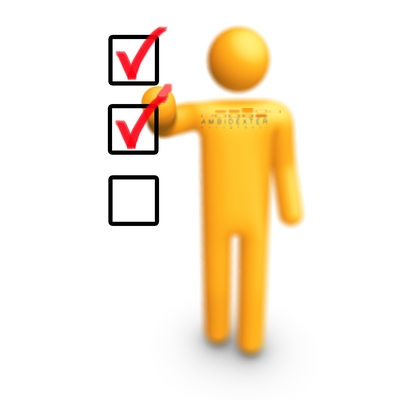Checklists: To make sure you don't forget anything...
Document Editing Checklist
Document Editing Checklist
PowerPoint/Keynote Presentation Checklist
PowerPoint / Keynote Presentation Checklist
Meeting Checklist
Meeting Checklist
- Are refreshments needed?
- Do any checklists need to be covered during the meeting?
- Do a roll call.
- Don't repeat for late comers!
- Do the attendees know each other? If not, allow for introduction time.
- Keep track of time and the agenda.
- Start and finish the meeting on time.
- Mind "air-time" junkies. Encourage all attendees to actively participate!
- Confirm decisions and action items at the end of the meeting.
- Do all action items have an empowered owner?
- If minutes will be provided inform participants how and when they can expect them.
- Are there any post-meeting checklists that need to be covered?
Pre-Meeting Checklist
Knowledge Communication Problems
Have you ever found yourself in a situation in which you needed to get to the bottom of something and then convey the results to a person or group of people? Did everything go as planned? Did "they" get it, or not?
If not, next time you may want to use the following checklist (including some problems to be aware of when checking them off):
CHECK
|
BE CAUTIOUS OF
|
| Do I have the right expert(ise) to analyze this? |
|
| Did I articulate clearly what I need to know? |
|
| Did I elicit the right insights? |
|
| Did I (you and your expert) optimize our mutual understanding |
|
| Did we assign the right actions? |
|
This checklist will certainly not solve all your knowledge communication problems but will at least make you aware of some of the issues, problems and challenges you may face!
Prophet syndrome: managers have a preference for outside experts. [Menon & Pfeffer, 2003]
Ingroup-outgroup: managers prefer to consult with like-minded peers rather than other professional groups [Blau, 1977]
ASK (anomalous state of knowledge): Managers often do not have the terminology to articulate their needs to experts [Belkin,1980 ]
Big picture problem: managers and experts deviate from the main issue and get lost in details. [Harkins, 1999]
Common ground: managers and experts are not aware of their differing background knowledge. [Clark and Schäfer, 1989, Olson & Olson, 2000 ]
Paralysis by analysis: experts have difficulties in concluding their analysis and proposing solutions [Langley, A. (1995) ,Lenz, R. T., Lyles, M. A., 1985, ]
Information Overload: experts are inundated with detail information and loose sight of the main objectives of their assignment [O’Reilly, 1980].
Hidden Profile: managers and experts only focus on their already identified mutual knowledge and neglect new insights. [Stasser & Titus, 2003]
Cassandra Syndrome: the managers ignore the experts’ warning and advice, but later on blame the expert if losses occur. [Mikalachki, 1983]
Groupthink: managers and/or experts ignore evidence or do not use available knowledge fully in order to preserve group cohesion. [Janis, 1982]
Expert paradox: the experts are not able to convey what they know to managers because they cannot articulate it in terms that management can understand. [Johnson, 1983]
Knowing-Doing Gap: managers and experts know what to do, but cannot execute it due to internal competition or wrong incentives [Pfeffer & Sutton, 2000]
More Articles...
Subcategories
-
Strategy Checklists
All Strategy related checklist can be found here.
-
Communication
All communication related checklists...
-
Project Management
All PM related checklists...
-
Operations
All Operations related checklists...




